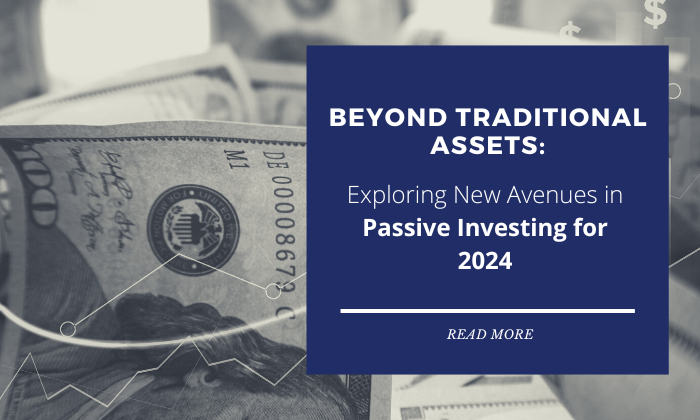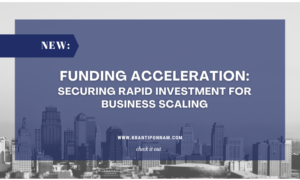Passive investing is a popular and proven strategy for generating income and growing wealth over time. By investing in a diversified portfolio of low-cost index funds or exchange-traded funds (ETFs) that track the performance of a market or a sector, passive investors can enjoy the benefits of compound returns, lower fees, tax efficiency, and reduced risk.
However, as the global economy and financial markets evolve and face new challenges and opportunities, passive investors may want to look beyond the traditional asset classes of stocks, bonds, and cash, and explore new avenues in passive investing for 2024. These new avenues may offer higher returns, lower volatility, and greater diversification, as well as exposure to emerging trends and innovations.
In this blog post, we will discuss some of the new avenues in passive investing for 2024, and how they can enhance your passive income and portfolio performance.
Alternative Investments
Alternative investments are assets that are not traded on public markets, such as private equity, venture capital, hedge funds, real estate, commodities, cryptocurrencies, and collectables. These assets may offer higher returns than traditional assets, as they can capture the growth potential of private companies, niche markets, and innovative technologies. They may also offer lower volatility and correlation than traditional assets, as they are less affected by the fluctuations and sentiments of the public markets.
However, alternative investments also come with higher risks, costs, and barriers, as they are often illiquid, opaque, unregulated, and inaccessible to most investors. Therefore, passive investors who want to invest in alternative assets need to do their due diligence, assess their risk appetite and time horizon, and choose the appropriate vehicles and platforms to access these assets.
One of the vehicles and platforms that passive investors can use to invest in alternative assets is ETFs. ETFs are funds that trade on public exchanges and can track the performance of various alternative asset classes, such as private equity, venture capital, hedge funds, real estate, commodities, cryptocurrencies, and collectables. ETFs offer the advantages of liquidity, transparency, regulation, and accessibility, as well as low fees and tax efficiency. However, ETFs also have some limitations, such as tracking error, market impact, and replication methods, that may affect their performance and returns.
Another vehicle and platform that passive investors can use to invest in alternative assets is crowdfunding. Crowdfunding is a method of raising capital from many investors, usually through online platforms, for various purposes, such as startups, projects, causes, or products. Crowdfunding offers the advantages of democratisation, diversification, and social impact, as well as the potential for high returns. However, crowdfunding also has some challenges, such as fraud, failure, and regulation, that may affect its reliability and outcomes.
Passive Real Estate Investing
Real estate is one of the most popular and profitable asset classes for passive investing, as it offers steady income, capital appreciation, tax benefits, and inflation protection. However, investing in real estate can also be costly, time-consuming, and complex, as it involves finding, buying, managing, and selling properties, as well as dealing with tenants, maintenance, taxes, and legal issues.
Therefore, passive investors who want to invest in real estate need to find ways to simplify and streamline their real estate investing process, and reduce their costs and hassles. One of the ways to do that is to invest in real estate investment trusts (REITs). REITs are companies that own, operate, and finance income-producing properties, such as office buildings, shopping malls, hotels, apartments, and warehouses. REITs pay out most of their income as dividends to their shareholders and are traded on public exchanges like stocks. REITs offer the advantages of liquidity, diversification, and professional management, as well as high yields and low fees.
Another way to simplify and streamline your real estate investing process is to invest in real estate crowdfunding. Real estate crowdfunding is a method of raising capital from a large number of investors, usually through online platforms, for various real estate projects, such as development, renovation, or acquisition. Real estate crowdfunding offers the advantages of democratization, customization, and social impact, as well as the potential for high returns. However, real estate crowdfunding also has some challenges, such as fraud, failure, and regulation, that may affect its reliability and outcomes.
Financial Innovation
Financial innovation is the process of creating new and improved financial products, services, systems, and models, that can enhance the efficiency, accessibility, and security of the financial markets and industry. Financial innovation can offer new opportunities and solutions for passive investors, as it can enable them to access new markets, assets, and strategies, as well as reduce their costs, risks, and barriers.
One of the examples of financial innovation that passive investors can use is robo-advisors. Robo-advisors are online platforms that use algorithms and artificial intelligence to provide automated and personalized financial advice and portfolio management, based on the investor’s goals, risk tolerance, and preferences. Robo-advisors offer the advantages of convenience, simplicity, and affordability, as well as low fees and minimums.
Another example of financial innovation that passive investors can use is blockchain and cryptocurrencies. Blockchain is a distributed ledger technology that records and verifies transactions without the need for intermediaries, such as banks, brokers, or governments. Cryptocurrencies are digital currencies that are powered by blockchain and can be used as a medium of exchange, a store of value, or a unit of account. Blockchain and cryptocurrencies offer the advantages of decentralization, transparency, and security, as well as the potential for high returns.
Conclusion
Passive investing is a smart and effective strategy for generating income and growing wealth over time. However, passive investors may want to look beyond the traditional asset classes of stocks, bonds, and cash, and explore new avenues in passive investing for 2024. These new avenues may offer higher returns, lower volatility, and greater diversification, as well as exposure to emerging trends and innovations.
Some of the new avenues in passive investing for 2024 are alternative investments, passive real estate investing, and financial innovation. These avenues can enhance your passive income and portfolio performance, but they also come with higher risks, costs, and barriers, that you need to be aware of and prepared for. Therefore, you need to do your research, assess your risk appetite and time horizon, and choose the appropriate vehicles and platforms to access these avenues.
If you are interested in learning more about these new avenues in passive investing for 2024, or if you need help with your passive investing strategy, please contact us today and let us help you achieve your passive investing goals with the best resources available.




